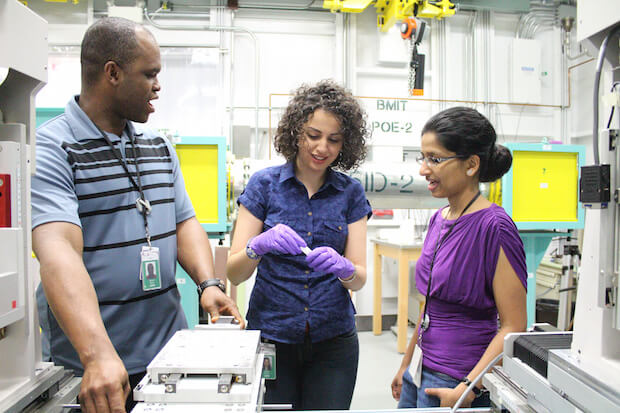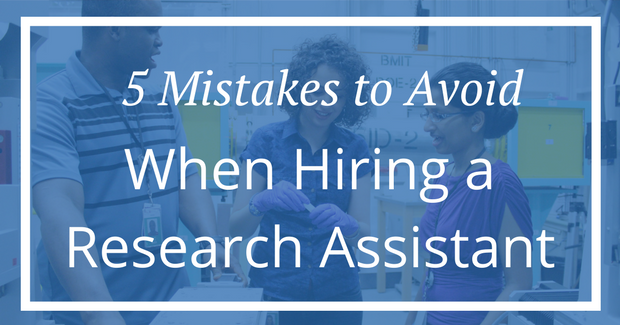When I was a student, I was always enthusiastic about assisting professors with their research as a Research Assistant – not just for the learning experience and the money, but also for the extra perks like potentially authoring journal articles and networking with others in my field.
As someone doing the hiring nowadays, I’m excited by the prospect of bringing a student into a new project because I know they will dedicate themselves to the work and help us get things done.
But the balance of this mutually beneficial relationship – between prof and student – is delicate, and as faculty and professional researchers, we must do our part to prevent RA’s from becoming disillusioned; if our assistants become overwhelmed, overworked, or disappointed, the quality of their work and the project overall will suffer.
Be sure your partnership will be as productive and beneficial to all by avoiding the following mistakes when hiring a research assistant:
Making them do what you can’t/wouldn’t do
Problem: Student research assistants often get stuck with the work that nobody wants to do. They may find themselves in a position in which they cannot get help or useful guidance on how to do this work and are “working in the blind”.
Solution: Be sure you aren’t assigning an unrealistic workload by having a concrete understanding of what needs to get done and how. Break down a project into tasks and decide how much time and effort should be afforded each task.
The key then is not to assign too many tasks to one individual. They simply won’t be achievable and you are setting both you and your assistant up for failure.
Also, keep in mind that most research assistants are most likely full-time students. School will (should!) always come first. If the RA is not able to continue to work on a task, your best bet is to pick up where they left it. You’ll be prepared to do this if you have organized the sequence of tasks for the project ahead of time.
Failing to establish clear expectations
Problem: Professors are at times unaware of the expectations or objectives of the student. For example, the student might be depending on the research output for his or her capstone project. He or she might need a recommendation letter to apply for fellowships or jobs.
Solution: Before taking on a new assistant, be sure to not only explain the project expectations from your end, but to ask them what their expectations are about the work as well.
Talk with them and ask what they want/expect out of their work in an open discussion. Then continue to be open to new ideas throughout the lifecycle of the project – this will encourage them to take ownership and might bring a fresh perspective to the research project.
If your RA mentions a recommendation letter, explain how long they have to work for you, how early they need to ask for the letter, etc. so you both know what to do when the time comes.

Not paying them enough
Problem: Not paying research assistants enough is a disincentive for working. It forces them to look elsewhere for funding and makes them undervalue the skills and education they have.
Solution: This one’s obvious, but if you don’t have enough funding to pay a research assistant a living wage, then simply don’t hire one. Students who work as research assistants are highly educated and qualified individuals. Treat them the way you want them to act.
If you have control over their pay rate, pay them well above the minimum wage. Otherwise, what’s the value of having an education?
Not establishing the project scope
Problem: When I was a student research assistant, I was assigned countless literature reviews (which were really boring) because “I would learn a lot from reading these articles”. There was no bigger picture and my hard work felt like it was for naught. Students want to feel like their work is meaningful. They want to feel involved.
Further, an apathetic employee will bring down your research project. On the other hand, when you have a research assistant who is completely psyched to be there, he or she will produce work that reflects that.
Solution: Be sure to give your assistant the full scope of the project – help him or her understand where all of this is heading, how you expect the findings of the research to “nudge the needle”. Your enthusiasm for the research cause will be contagious.
It also makes the RA care about the project and its outcomes: nothing better to have someone who cares enough to resolve problems as they arise and ask for help when needed. Someone who doesn’t care will move onward, even when mistakes and problems keep accumulating.
Micromanaging them
Problem: Some professors or researchers will check every single move a student does. Some expect student researchers to strictly follow what they planned initially instead of adapting planning to the moving pieces as you go. Inflexible planning and bottlenecking student efforts create an experience that is not pleasant. By micromanaging, you are not really promoting accountability (problems will be disguised) and not allowing the student to create and add value to the project.
Solution: You want to be clear about expectations, tasks, and milestones, but you don’t want to micromanage your research assistant every step of the way. Trust that they are capable and resourceful enough to do their work well and then delegate tasks. Micromanaging will stress you out and actually make it more difficult for them to accomplish their tasks in the end.
Let them create their own output as long as they fulfill the same objectives as the ones you created.
Check out what Modus Operandi can do to help you manage your projects.

